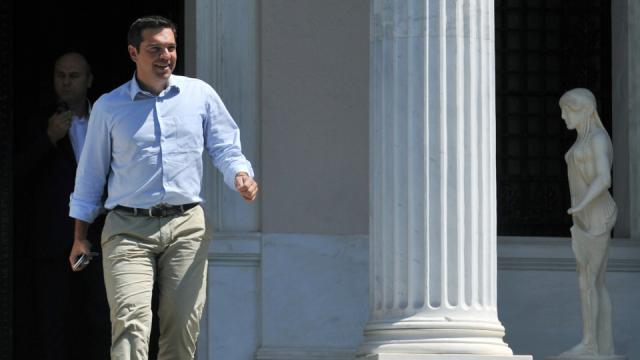
Greek Prime Minister Alexis Tsipras is resigning days after the Greek parliament officially approved a third stringent bailout package that will impose further austerity on the struggling archipelago.
Government officials told reporters Thursday that Tsipras will turn in his official resignation papers this afternoon and call for a new parliamentary election on September 20th. Tsipras hung on for weeks longer than eccentric Finance Minister Yannis Varoufakis, who motorcycled off into the sunset immediately after a July referendum that appeared to put Greece on the verge of exiting the European Union.
In the weeks since that vote, cooler heads prevailed and struck a deal to keep Greece in the currency group — and keep a foot on the throat of the country’s economy. The deal “concede[s] ultimate authority over much of Greek policymaking” to the European Central Bank and other creditors, according to an analysis of the package from The Guardian, and will bring “a radical overhaul of the greek economy, stipulating major reforms of health, welfare, pensions and taxation systems, alongside more ambitious privatization schemes.”
These reforms will make Greece’s social services less generous at a time when economic conditions are already so dire as to constitute a humanitarian crisis. Greece’s economy has shrunk by more than a quarter since the first bailout began, far exceeding International Monetary Fund (IMF) predictions that austerity would only cause a brief contraction before returning the country to growth. The deal is a catastrophic defeat for Tsipras’s administration, and observers believed it was likely he would lose his job one way or another from the time that he reluctantly called for lawmakers to approve the bailout.
Tsipras rose to the leadership of the country in January after Syriza, the radical leftist party he headed, won roughly half the seats in Greece’s parliament. Voters exhausted by five years of economic punishment at the hands of Greece’s european creditors hoped Tsipras’s team would be able to reverse the tide of austerity and outfox Germany’s Angela Merkel in negotiations over further financial assistance. But Tsipras’s party failed to win that political battle, even though it has become clear to both analysts and the IMF that Europe must forgive some of Greece’s bailout debts because the goals of both the old deals and the new one are almost certainly unattainable.
Tsipras could have opted to call a confidence vote within the parliament instead of resigning. The decision to quit and call new national elections instead signals that he felt the number of Syriza members who would oppose his continued leadership was too large to surmount by building a new coalition — or that he didn’t wish to split the party further than the renewed bailout deal already has.
3 WAYS TO SHOW YOUR SUPPORT
- Log in to post comments











